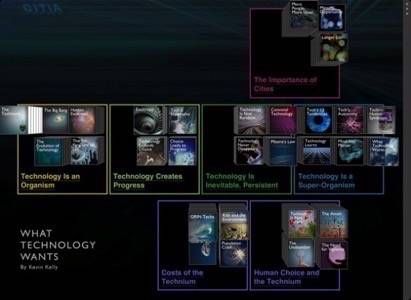
Kevin Kelly’s book What Technology Wants was one of my favorite non-fiction books of 2011. In my April 2011 review, I gave it 5 out of 5 stars. It’s fitting that Kelly’s book is the first to be turned into an iPad app on a new iOS platform called Citia. The result isn’t an ebook though, it’s more like a condensed summary of the book’s main ideas. So is Citia just a modern day CliffsNotes, or something more substantial?
The Kevin Kelly app is now available in the App Store for $9.99 (note: unfortunately geo restrictions apply). I obtained a review copy and checked it out.
Those of you with long Internet memories will immediately see the resemblance of Citia to HyperCard, an Apple application from the late 80s and early 90s that was a precursor to the World Wide Web. Like HyperCard, Citia uses the concepts of “cards” and “stacks” to organize information.
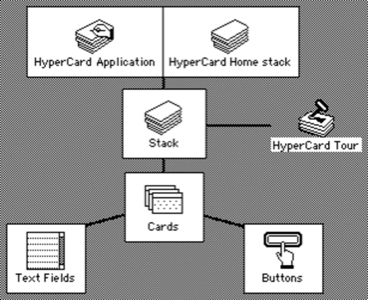
Of course, Citia is much more visually appealing. Founder and CEO of Citia, Linda Holliday, demoed the app at the All Things D conference a couple of weeks ago and explained that the goal of Citia is to “deconstruct it [the book] on a visual axis.”
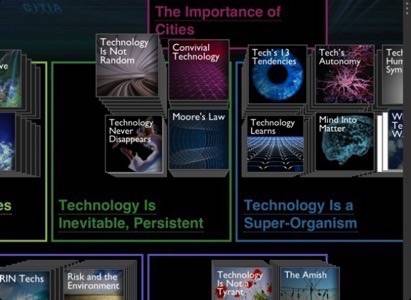
Kevin Kelly’s book has been deconstructed into what Holliday called a “thesis.” It’s been divided into 7 topics, totaling less than 20,000 words – much less than the 400 pages of the original book. The app also includes multimedia, such as images and video.
The HyperCard concept was used, Holliday explained, because they wanted the app to have modular content. This allows the reader to re-organize the information and consume it in a non-linear fashion. The reader can also theoretically share bits of it, via Facebook, Twitter and email. However, that part seems to be buggy, as neither Twitter nor Facebook worked for me in my tests. A really interesting concept that Citia hopes to introduce soon, when it has more books in its collection, is to show connections between ideas across books. If you have prior knowledge about a particular topic from reading another Citia book, the app will recognize that and you won’t have to read about it again.
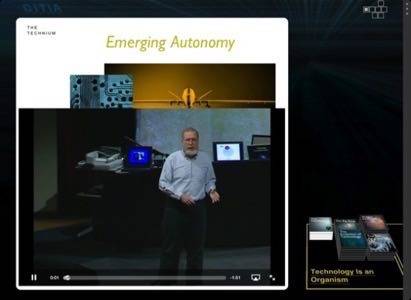
How Citia’s Kevin Kelly App Compares to The Actual Book
Since I’ve already read ‘What Technology Wants,’ I was curious to see how the app would differ.
After the HyperCard-like novelty wears off, the next thing I noticed was that the Citia version isn’t written by Kevin Kelly himself. In fact it’s written in scholorly editor style, kind of like reading The Economist magazine. Each ‘card’ is a series of quotes from Kelly and interpretations of what Kelly wrote in the book (e.g. “Kelly doesn’t accept the idea of evolution as a series of genetic accidents […]”).

One of the most powerful chapters in Kelly’s book was one entitled ‘The Unibomber Was Right’. It runs for 18 pages in the paper book, but is condensed into 4 cards in the Citia app. It’s a powerful chapter, because it tackled the moral and ethical issues around an ever more powerful technium (a Kelly-invented term that means “a system of technologies”). The Unibomber was Ted Kaczynski, who wrote a manifesto about destroying modern technology before it destroys us. In the name of his manifesto, Kaczynski killed 3 people with mail bombs between 1978 and 1995. As a result, he’s currently serving a life sentence in prison. In Kelly’s book, Kaczynski’s theories are explained and at first defended. However, Kelly ends the chapter by attacking Kaczynski’s moral position:
“But despite the reality of technology’s faults, the Unibomber is wrong to want to exterminate it, for many reasons, not the least of which is that the machine of civilization offers us more actual freedoms than the alternative […] so far the gains from this ever-enlarging technium outweigh the alternative of no machine at all.”
In the Citia version, the 4 cards summarize well the ideas in the chapter. But it also loses a lot of its impact, because Kelly’s argument was deep and gradually unfolded over 18 pages of storytelling mixed with theory.
But perhaps that’s part of the point of Citia: if you want to delve deeper into the ideas of a Citia ‘book’, then you’ll need to buy the paper or ebook version and spend more time reading. Linda Holliday herself alluded to this, saying that Citia apps won’t replace the books they’re based on. Instead the aim is to complement the author’s book and lead people to buy it, should they want to explore the ideas more deeply.
Why Non-Fiction and Not Fiction?
Citia is designed for non-fiction books, not fiction. Holliday explained that “we’re working with non-fiction because the reader is more goal-oriented [and] they want the value of the content and not necessarily the duration of the journey [i.e. a long book].”
The company is targeting business and technology books to start with, because often those books are organized as a stack of ideas. Holliday said that the initial response from non-fiction authors has been positive: “most of them [the authors] say ‘this is how I already work.'”
After Kelly’s, the next book being released as a Citia app is Richard Florida’s Rise of the Creative Class. For now each title is its own app, but Citia is working on a bookshelf type app to house multiple books.
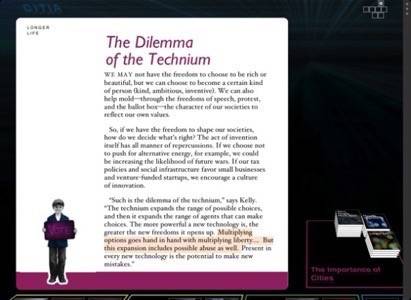
Is This CliffsNotes, Or Something More Useful?
In a sense, Citia apps are like a modern day version of CliffsNotes – that is, explanatory summaries of full-length books. Like CliffsNotes, you won’t get the full story with a Citia book-app. You’ll have to read the paper or ebook version for that.
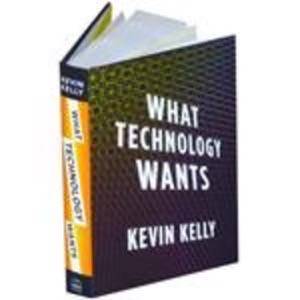
But despite that limitation, I can see Citia being very useful for non-fiction books. I’m an avid reader of non-fiction, but there are too many books I want to read and not enough time. With some authors or topics, I will want to read the whole book. Anything Kevin Kelly writes, for example. But for many other non-fiction books, I would rather “read” it in an hour via Citia than spend weeks on the full book. So Citia fills a need for me; and no doubt many others.










